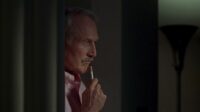It’s been 25 years since I first watched the end of My Best Friend’s Wedding from the backseat of my parents’ car. We had all gone to the drive-in to see Speed 2: Cruise Control, but I allowed my eyes to wander. This drive-in had four screens, and the clearest screen in view was playing another movie I wanted to see that summer, one starring Julia Roberts, a film of enduring decency.
I’ve been a fan of Hollywood romantic comedies for most of my life, less so over the past ten to fifteen years, but in the late nineties, I was all over that genre, whether the movies were good or not. (In fact, I loved them so much I saw Picture Perfect just a few short months later in a mostly empty theater, though that mostly might have been due to my crush on Jennifer Aniston.) Suffice to say, due to things beyond my pre-teen control, I did not end up making it to see My Best Friend’s Wedding that summer, but you better believe I rented it on day one when it came out on video at the end of the year.
Revisiting it recently, I am happy to report that I might actually love it more now than I did then. When I first watched it, I delighted in Roberts’ conniving performance, the fact that the main character was essentially the film’s villain, was swooned by Cameron Diaz’s Kimmy, absolutely loved Rupert Everett’s George, and smiled brightly during that scene where George and Michael’s family sing “I Say a Little Prayer” in the restaurant.
I still love all of those things, but what stands out to me most now is how satisfied I am that not only does Roberts’ character Jules not steal Michael away from Kimmy but that she ends up dancing with George, her friend and editor, as the credits begin to roll at the end.
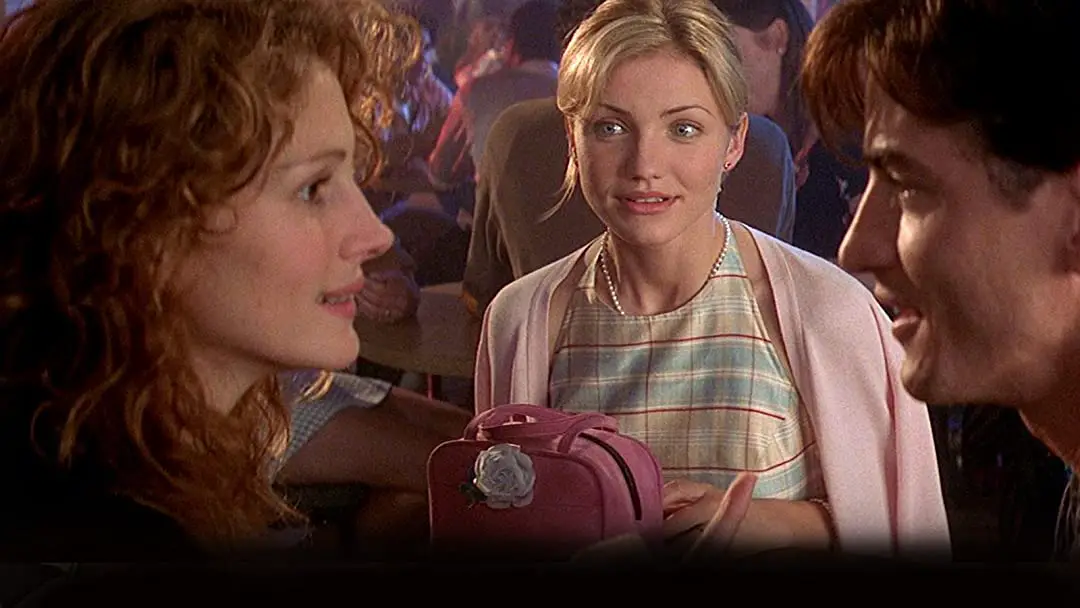
On the surface, the film argues that it’s okay to be alone with a friend to keep you company and that a person doesn’t need a romantic relationship to be happy, This is kind of remarkable, especially given that two and a half decades have passed since its initial release. I applaud director P.J. Hogan, credited writer Ronald Bass, and everyone involved in shaping this film. If My Best Friend’s Wedding were released today, I think most would view it as pretty progressive on that front.
As for the character of George, I can only be honest as a cis male. I still love his character, and I still believe Everett deserved an Oscar nomination for Best Supporting Actor. He plays George with such confidence that I can’t help but hang on to his every word. (The accent doesn’t hurt.) And even though there are chunks of his character that mostly serve Jules’ story, I like that he’s shown to be such a good friend to her, honest but still supportive.
After all, even as he chastises her for what she’s up to (stealing Michael away from Kimmy), he goes along with her scheme and pretends to be her fiancé. And, man, watching him play his version of a heterosexual male is still hilarious. How he manages to still pull off that “I Say a Little Prayer” number is icing on the cake. He doesn’t come across as gay to anyone there. In fact, he seems even more perfect to Michael and Kimmy’s families, especially Kimmy’s cousins (“the vengeful sluts”).
This brings me to something else that’s interesting. In 1997, Ellen DeGeneres came out, and it was a big deal. In the world of My Best Friend’s Wedding, aside from Michael (who, after listening to Jules speak about George, believed him to be gay), no one really seems to consider George being gay, and the film itself doesn’t seem to draw much attention to his sexuality, other than mentioning it here and there.
Is the film proposing the radical notion—at the time—that gay people are just people? George is not a stereotype, but even if he was, the film doesn’t treat him any differently than it does anyone else. The villain of the film is the film’s lead. He happens to be her friend, and rather than siding with her, he stays her moral compass.
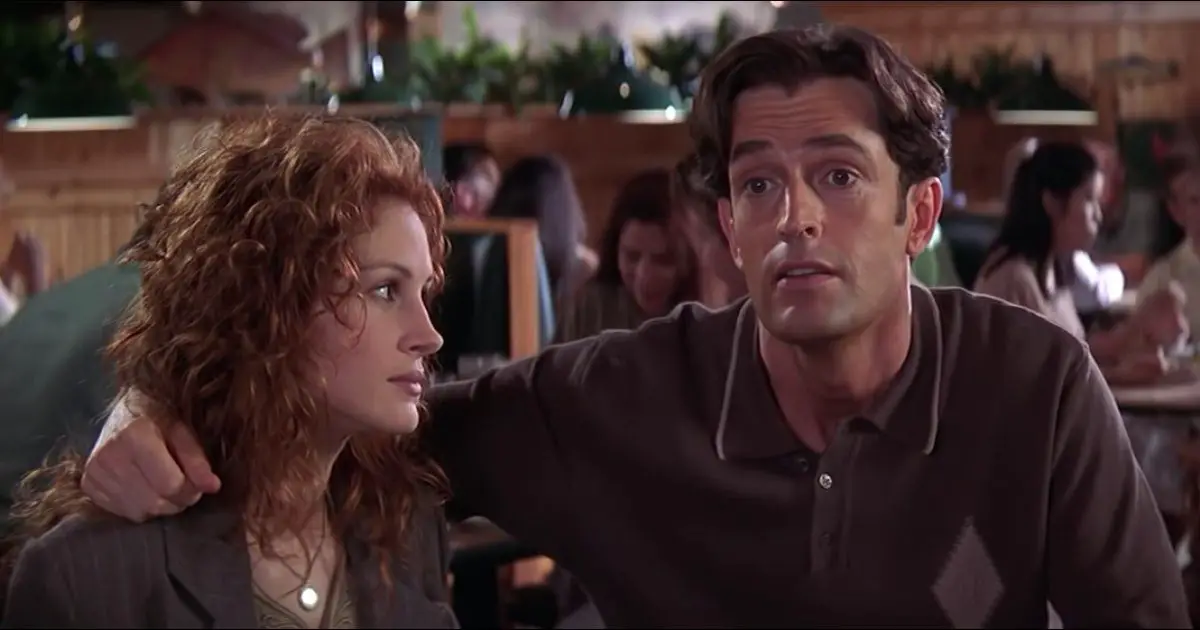
George is a good person. He goes to that wedding reception at the end, not for himself, but to console a friend, even someone who would do something rotten like ruin a wedding.
Sure, he whispers the word “gay” when talking to Jules on the phone at the end, but I can still see that moment being the same now. (That said, George having an instant to simply be gay without having to hide it would be more appropriate now, I suppose.) George doesn’t care what anybody else thinks. He seems too awesome for that. However, he recognizes that this instance isn’t about him, so he goes with the late ‘90s flow and whispers that word that should be spoken at a much higher volume now.
They meet up at the reception. Then they dance, and they smile, and they laugh. And the credits roll.
Jules does not deserve a happy ending. I didn’t think that 25 years ago, and I don’t think that now. Again, I am so satisfied she doesn’t end up with Michael. Now, don’t get me wrong. As I stated earlier, I actually like Roberts’ performance quite a bit, and I’d argue that is more the reason I don’t hate Jules for what she’s doing. Roberts is so effortlessly affable in this role that it’s kind of ridiculous. I mean, she does some terrible things in this movie, like writing a fake email to create tension between Michael and Kimmy, which nearly does the job of destroying their wedding and relationship.
Even before the start of the film, we learn that Jules wasn’t the warmest person in the world, as Michael describes her pulling away from him whenever he wanted to get a little intimate in public. Although to be fair, public displays of affection can be awkward and/or eye-roll-inducing, so I don’t blame Jules. Still, this detail seems indicative of their relationship when they were younger.
Heck, at the beginning of the movie, Jules is hesitant about even calling Michael back because she believes he’s calling about a pact they made years before concerning marrying one another if they were both single when they both turned 28. It’s really only after she finds out that Michael is marrying someone else that she wants him. Pretty messed up.
And Kimmy is a decent person. She’s definitely young and rich, but she’s not an asshole about it (though I do take issue with the way she drives). Kimmy does not deserve to have her happiness taken away by Jules, someone she embraces with open arms because she’s an old friend of the man she’s about to marry.
All in all, I don’t hate Jules, but I’m not entirely sure I like her. That seems by design. My Best Friend’s Wedding does not hide or mute what it’s about. Jules wants to ruin both Michael and Kimmy’s wedding as well as their relationship. To top it off, she wants to steal Michael away. Thankfully, she sees the error of her ways, thanks in part to a phone call with George and a conversation with Michael in which he describes his proposal to Kimmy.
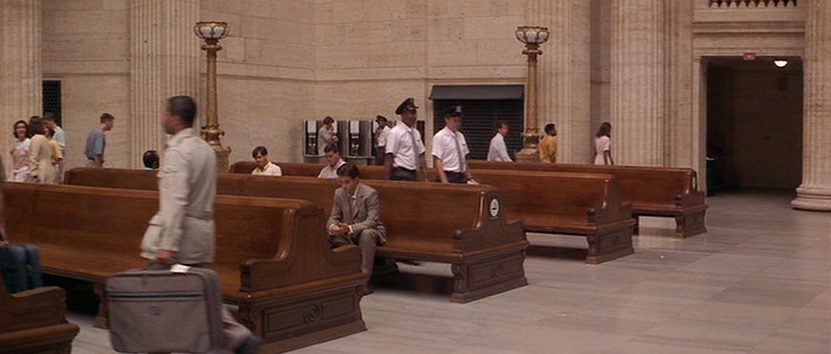
That leads us to the Jules and Kimmy confrontation in a public restroom, which is also satisfying because the film allows Kimmy to let Jules have it. (It’s also great to see the crowd’s reaction to what Jules has been up to this entire time.)
The film never excuses Jules’ behavior, nor does it let her off the hook. She doesn’t deserve Michael, so she’s alone in the end. Yet at the same time, the film cares about her enough to give her that final scene with George. (One could make the case that she doesn’t deserve him either, though, given her behavior.) As they dance and the credits roll, yes, I am satisfied.
As I’ve grown and matured, I’ve come to understand that the world is just full of selfish people doing rotten things. How, then, can I still like this film? I suppose it comes down to two things. The first is obvious enough: it’s fiction and not real life. The second, though, is the thing that makes the film work as well as it does: no one in the film acts less than decent. What I mean is that Jules never comes across as a villain, even though that’s exactly what she is. Michael’s outburst towards Kimmy wanting him to quit the job he loves and work for her father is quickly dismissed as a one-off reaction and not suggestive as to who he is as a person.
George is a good person, even as he lies about his sexuality and his supposed romantic relationship with Jules. Kimmy is good, too, really only letting anger get the best of her once she realizes what Jules has been up to the entire time, and at that point, I don’t blame her.
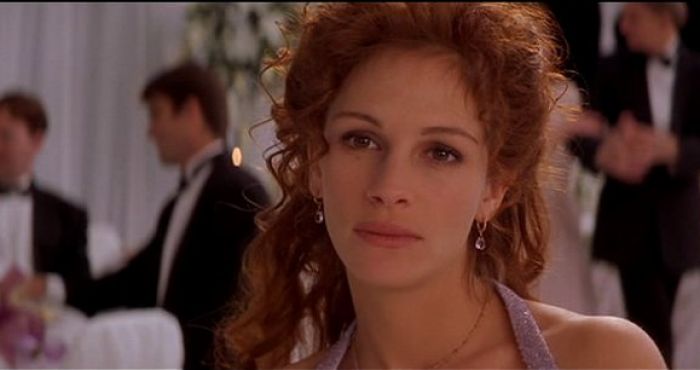
My Best Friend’s Wedding, oddly enough, is about good people. That includes Jules, who is ultimately just being reckless in her attempt to hold on to her best friend. Given that she learns her lesson by the film’s end proves that she’s not a bad person. Because no one is all good or all bad. It’s easy to say a villain is evil, because, well, they’re the villain. But it’s got to be more than that.
Even though it’s a 25-year-old Hollywood romantic comedy, My Best Friend’s Wedding’s statement still rings true. The villain doesn’t get a “happy ending,” but they do get the opportunity for one if they can not only see that they were wrong but also change. Jules is not the same person in the end and thank goodness for that.



